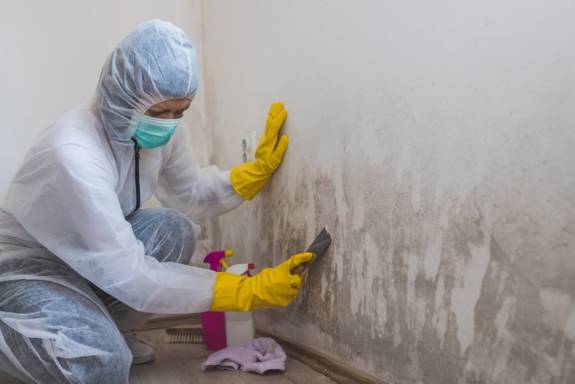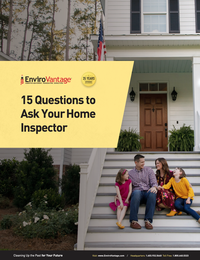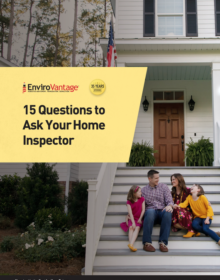Hiring a Mold Remediation Contractor? Ask These 11 Questions First

Hiring a contractor is the first step in any mold remediation project, but where do you begin? Mold is a type of fungus that can cause a variety of health problems — including a runny or blocked nose, watery or red eyes, skin rashes, sinusitis, wheezing, asthma, and/or pneumonia — which is why removal is so important.
But you want it done safely and efficiently, and you don’t want to have to worry about someone overcharging you to get it all done. Read on to learn about 11 questions you should ask when hiring a contractor, plus tips for finding the right company for the job.
When Should You Hire a Mold Remediation Contractor?
You should hire a contractor if you see mold or suspected mold. You should also reach out if you can’t see mold, but you, your family, or your pets have unexplained allergies.
Mold is also commonly found during a home inspection and sometimes during home renovation projects.
11 Questions to Ask When Hiring a Mold Remediation Contractor
1. What is your background?
The last thing you want is an unreliable contractor who delivers sub-par work or gouges you in terms of price. Here are some more specific questions to consider: How long has the company been around? Are they well-established? How many trained and certified employees do they have? Has the company won any awards? Are they accredited?
You could also ask whether the contractor is affiliated with any relevant organizations, such as:
- American Council for Accredited Certification (ACAC)
- Indoor Air Quality Association (IAQA)
- Institute of Inspection Cleaning and Restoration Certification (IICRC)
- National Air Duct Cleaners Association (NADCA)
2. Do you offer mold inspections and mold testing?
A mold inspection is a visual assessment of an area (or multiple areas) to determine whether mold is present.
If you can’t see mold, but suspect you may have it in your home, a certified mold inspector will conduct mold testing. This person will conduct scientific air sampling and collect samples that will be analyzed in a lab.
A mold remediation contractor may offer to visually inspect the area free of charge. Some may charge up to $300 for a visual inspection but will deduct that amount from the final invoice if they are hired.
If you aren’t sure whether you have mold and need testing for verification, you can still call a remediation company, but they may refer you to a third-party mold inspector. Why? A mold removal company may want to avoid a conflict of interest since they would be both testing and performing the work. The average cost for mold testing is $500 to $1,500.
3. How quickly can I get a mold inspection?
It depends on the contractor and their schedule, but many will come to your home within a few days to a week of your initial phone call.
The mold investigator will come to your home, look at the area in question, and determine next steps for mold removal. All of this can take place within a day or two, and depending on the company’s schedule and workload, you could schedule removal to take place that same week.
If you need to hire a mold investigator to perform air sampling or collect samples, you should expect the results in a few days, though many inspectors use labs that have a 24-hour turnaround.
4. Does it matter what type of mold I have?
The most common types of mold found in New England homes are Aspergillus/Penicillium, Cladosporium, and Stachybotrys Chartarum. All three have the potential to cause adverse health effects, but Stachybotrys Chartarum, also known as black mold, is a toxic type of growth that typically results from a continuous water leak over an extended period of time.
It’s important to note that the cost of removal is generally the same no matter what type of mold you have in your home.
5. What is your process for mold remediation?
A reputable company will first identify and locate the source of moisture that allowed the mold to grow in the first place. They should then form a detailed strategy by identifying the necessary steps to correct the issue, including any materials needed for removal or sanitization.
Mold remediation contractors often use HEPA-rated equipment and physical barriers to reduce the spreading of mold spores. There is a wide range of treatment options, from dry ice blasting and EPA-registered solutions to hydroxyl generators and applying mold-resistant coatings.
Stay clear of any company that claims that simply spraying a chemical in the air will remove the mold. Remediation doesn’t work that way — you have to physically remove the mold.
6. What should I expect from you?
Just like any business relationship, you want to solidify your expectations from the start. The contractor should establish how they expect to communicate with you (phone, text, email, etc.) and the expected timeline for remediation. They should also welcome your questions. You should avoid anyone who seems to rush your conversations or gloss over certain aspects of the process.
7. How much does mold remediation cost?
A contractor may give you an estimate, but they should come to your house and inspect the area firsthand before providing a quote.
Mold remediation cost will depend on two factors: the location of the mold in your home and how much is present. Costs can range anywhere from $1,500 to $50,000. The process often involves the building of containment barriers so that the mold doesn’t cross-contaminate other areas of the home when being removed. Creating these isolated work zones adds to the overall cost but is a critical step.
8. How long does mold remediation take?
It depends on the contractor’s workload, but the entire process from the initial phone call to complete removal could take place within one week. Every situation is different, however, so it’s best to discuss this in your initial phone call, especially if you’re on a tight timeline.
9. What if you find another problem while removing the mold?
Unfortunately, other problems may surface during mold removal, such HVAC issues or asbestos. If you can, look for a mold remediation company that’s cross-trained in a variety of environmental and indoor air quality services. That way they can take care of any other issues that may arise; otherwise, you’ll have to reach out to a separate contractor.
10. How can I prevent mold?
A good contractor will give you tips and advice on preventing the return of mold. The most important thing to remember is that mold thrives on moisture, so it’s essential to prevent and stop any leaks or water intrusion. For example, if you had mold in your basement, it’s recommended that you invest in a self-draining dehumidifier that’s capable of maintaining a relative humidity of 35-50%.
11. Can you guarantee mold from returning?
Some companies may claim to remove 100% of mold from your home, but that is physically impossible. Why? Mold is all around us in healthy levels. The goal of mold remediation, or removal, is to bring the mold spore count to what’s called “a normal ecology level” and eliminate the reasons unhealthy levels of mold are happening in the first place.
After mold is removed from your home by a contractor, you may want to hire an independent mold inspector to take air samples of the work zone and the outdoor air. The data is compared, and if the mold remediation was done correctly, the air samples from within your home should be at or below the same levels as the outdoor air.
How to Find a Reputable Mold Remediation Contractor
The first step, of course, is finding the right contractor, and a good place to start is your network of family, friends, and colleagues. If you’re in the process of buying or selling a home, your real estate agent should be able to provide a few reputable recommendations. You should also consult the websites of trade-specific certification boards, such as IAQA, ACAC, or IICRC.
Your Family Deserves a Healthy Home
If you have questions about mold, or think you may have it in your home, please give us a call. We’ll come out and inspect the area in question — free of charge!
As an industry leader with more than 35 years of award-winning experience, EnviroVantage specializes in indoor air quality (IAQ) improvements, mold remediation, asbestos abatement, duct cleaning, and more. We have helped thousands of homeowners eliminate problems in their home, including all types of mold.
Contact us today with any questions or for more information!

Are you ready to buy or sell your home?
Whether your offer has just been received or you’re thinking about putting your house up for sale, consider these 15 important questions to ask your home inspector.

Questions?
We’d be happy to answer them — and talk about how EnviroVantage can support your next abatement, demolition, or remediation project.